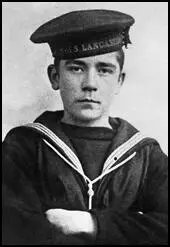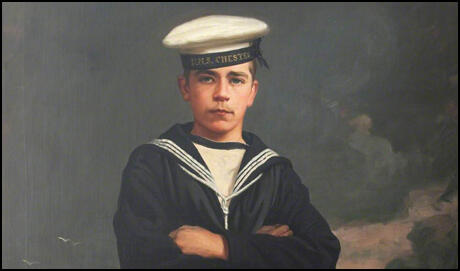John Cornwell

John Travers Cornwell, the son of Eli and Alice Cornwall, was born in Leyton, Essex, on 8th January, 1900. When he was a child the family moved to Alverstone Road, East Ham.
Cornwall left school at the age of 14 and found employment as a delivery boy. On the outbreak of the First World War his father joined the British Army. His older brother, Arthur Cornwall, also joined the army and served on the Western Front.
In October 1915 John Cornwall joined the Royal Navy as a boy sailor. After receiving his basic training at Keynham Naval Barracks at Plymouth he joined HMS Chester at Rosyth, Scotland.
After the outbreak of the First World War, attempts were made to draw the smaller German Navy into the North Sea for a major battle. Admiral Hugo von Pohl, the commander of the German High Seas Fleet, resisted these temptations, but in February 1916, he was replaced by the much more aggressive, Admiral Reinhardt von Scheer.
In May 1916 Scheer decided that he would take on the might of the British Navy. As a bait, Scheer ordered Admiral Franz von Hipper and 40 ships to begin a sweep along the Danish coast. When he heard the news, Admiral John Jellicoe, who was at Rosyth, gave instructions for the Grand Fleet to put to sea.
With the absence of reconnaissance aircraft, both Jellicoe and Scheer sent out scouting cruisers to locate the position of the enemy. The two sets of scouting cruisers made contact and after a brief gunfire exchange, returned to guide their fleets to battle.
Meanwhile, Admiral David Beatty, and 52 ships, including HMS Chester, had left Scarpa Flow in the Orkneys and were on the way to join Admiral Jellicoe and the Grand Fleet. At 15.45, Beatty came into contact with Admiral Franz von Hipper and his 40 ships. The two fleets opened fire at a range of 15 kilometres. The hazy visibility created problems for both sides but the position of the sun gave a significant advantage to the German captains.
During this exchange of fire at the Battle of Jutland Cornwall was severely wounded. He remained at his post until HMS Chester retired from the action with only one main gun still working. According to one report: "Cornwell was found to be sole survivor at his gun, shards of steel penetrating his chest, looking at the gun sights and still waiting for orders".

John Cornwall was taken to Grimsby General Hospital and his family were informed that he was seriously wounded. John Cornwall died of his wounds on 2nd June 1916 and was buried at Manor Park Cemetery in London.
In September 1916 Admiral David Beatty recommended that Cornwall for a posthumous Victoria Cross and George V endorsed it. The recommendation for citation included the following: "John Travers Cornwell, who was mortally wounded early in the action, but nevertheless remained standing alone at a most exposed post, quietly awaiting orders till the end of the action, with the gun's crew dead and wounded around him. He was under 16½ years old. I regret that he has since died, but I recommend his case for special recognition in justice to his memory and as an acknowledgement of the high example set by him."


